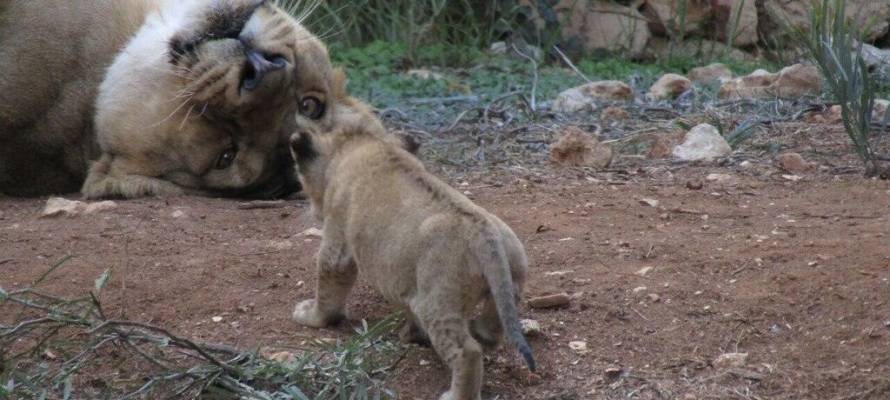A lioness named Yasha gave birth to twins in a bush in the lions’ enclosure.
By Darice Bailer, TPS
The Jerusalem Biblical Zoo has a newborn lion cub to greet visitors strolling through its black iron gates.
It’s a 10-week old Asiatic lion cub who arrived on the first of October, and it is “super cute,” said Benjamin Fainsod, the zoo’s head of carnivores and orangutans.
A lioness named Yasha gave birth to twins in a bush in the lions’ enclosure. One cub was accidentally struck by Yasha and died of its injuries on Wednesday.
The zoo staff hasn’t yet named the cub because they aren’t yet sure whether it is male or female. But Fainsod will try to catch it inside the enclosure after separating it from the parents and determine that soon. Once the cub turns three months old, it will be bigger, stronger and ready to fight back.
Yasha doesn’t worry about her mate, Gir hurting the cub. The young lion climbs all over its father and he licks his cub. “He’s the perfect dad,” Fainsod said.
Children standing in front of the lions’ grassy home at the zoo watched the baby lion play, paw its mother’s chin, and pounce on the black tip of its father’s tail. The cub explored the bushes, climbed rocks, and tumbled over before taking a nap.
Asiatic lions hunted the land around Jerusalem during Biblical times and lions are mentioned more than 150 times in the Bible. Also, the lion is the official symbol of the City of Jerusalem.
The zoo’s very first lion cub arrived in 1943. That year, the founder of the zoo, a Hebrew University zoology and etymology professor named Aharon Shulov, arranged for a friend helping the British Brigade in North Africa to ship him an orphan cub for Shulov’s little zoo on Jerusalem’s Shmuel Hanavi Street. It was the first lion in the Holy Land in several hundred years after disappearing during the Crusades.
The litter of Asiatic cubs was the second born to Gir, whom the zoo received from a zoo in Sweden, and Yasha, who came from a zoo in Germany.
Yasha and Gir’s first litter were the first Asiatic cubs born in captivity in Israel. That pair died of Vitamin A deficiency, and the zoo is trying to ensure that the recently born cub survives.
“That’s one of the big problems in captivity and in the wild, the Vitamin A deficiency,” Fainsod said. “It places pressure on the spinal cord which can lead to death. It’s a known problem with Asian lions.”
The zoo sprinkled Vitamin A on Yasha’s meat to help build up the vitamin supply in her body and pass it on to her fetuses before birth, and staff continue to add Vitamin A to her food to pass the vitamin on to the cub through her milk.
The Asiatic lion is an endangered species according to the International Union for Conservation of Nature, with just a small population of 523 in the last census in 2015. Hunting by Indian royalty and British colonial officers is one reason for their decline.
Now the official count for these lions has grown to several hundred. The lions are found in and around the forests and savannah of Gir National Park and wildlife sanctuary in Gujarat in northwest India. It’s the only place in the world where the Asiatic lions live in the wild. Yet that is in an area which is smaller than Greater London, according to the Zoological Society of London.
Also, because there is such a small population, the lions inbreed, which causes genetic problems.
The Jerusalem Biblical Zoo has programs to rescue and breed endangered animals and return them to the wild.
And families enjoy watching the cub play.
“Many people come to it,” Fainsod said.
[chanulah boxed]
